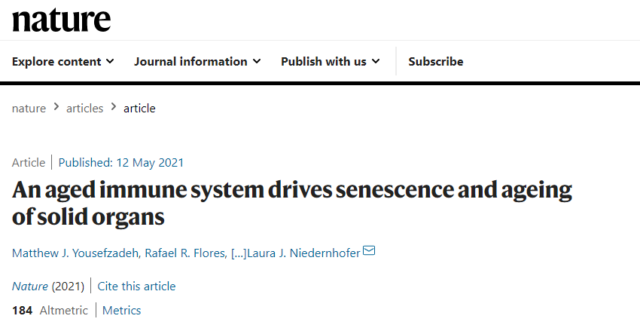Found for the first time: Replacing young immune cells can fight aging!
- WHO Releases Global Influenza Vaccine Market Study in 2024
- HIV Infections Linked to Unlicensed Spa’s Vampire Facial Treatments
- A Single US$2.15-Million Injection to Block 90% of Cancer Cell Formation
- WIV: Prevention of New Disease X and Investigation of the Origin of COVID-19
- Why Botulinum Toxin Reigns as One of the Deadliest Poisons?
- FDA Approves Pfizer’s One-Time Gene Therapy for Hemophilia B: $3.5 Million per Dose
Found for the first time: Replacing young immune cells can fight aging!
Found for the first time: Replacing young immune cells can fight aging! “Nature” found for the first time! Immune cell aging will promote the aging of the whole body! Replacing young immune cells can fight aging!
At present, there is a relatively mature cell cryopreservation technology in the world, using liquid nitrogen as low as minus 196 degrees for cell cryopreservation, so as to preserve our young immune cells for future use when needed.
Not much nonsense, this article published on May 12 in “Nature” once again refreshed our understanding of immune cells. At the beginning of the article, we first summarize the information of the article, and then we will take a closer look at the entire article. The content of the article:
Immune aging will lead to systemic aging-not only limited to immune organs, but also damage to non-immune organs;
Transplanting senescent immune cells to young mice will promote the aging process;
Transplanting young immune cells to aging mice can partially reverse the aging process.

Image source: “Nature” official website
It can be said that this research has brought the importance of immune cells to human health to another level! This is also the first time that scientists have discovered the effect of immune cell aging on systemic aging-adding a rich touch to our fight against aging.
In fact, we have mentioned in many previous articles: Immune cells can eliminate senescent cells, but with the increase of age, the senescence of immune cells caused by the aging of the human body once again promotes the aging process. Let’s make an inaccurate analogy: It’s like multiple parts in a car. One of the parts is damaged, causing the damage of other parts to increase, and the damage of other parts will cause continuous damage to the part. This forms a negative, downward spiral, and eventually leads to the scrapping of the car-aging is such a similar negative cycle.
Of course, we don’t know when each person’s specific aging starts, but we can confirm whether the person’s body has begun to age through the changes in various indicators in the course of each person’s life. In order to study the connection between aging and immune cell aging, the researchers knocked out a key gene in the immune cells of mice. The result of this gene knockout is that the immune cells of mice have aging characteristics that are incompatible with age-simply In other words, it is that the immune cells of mice have “decayed before they are old.”
The researchers compared the immune cells of mice with “aging before ageing” with normal aging mice (aging mice 2 years older) and found that the mice with knockout genes showed immunity similar to that of normal aging mice. Characteristic, this proves that the immune cells in the mouse model do show signs of aging.
The study found that in addition to the immune organs, other organs of the mice also showed various DNA damage and aging, and the characteristics of the various organs of the mice were also biased towards the characteristics of aging-in other words, the mice that were immune to aging There are signs of aging all over the body, and obviously, the life span of mice has also shortened.
In addition, transplanting aging immune cells into aging mice will make the situation in these mice “worse worse”, aging is accelerated, and their life span is shorter.
Researchers transplanted normal, healthy, and young immune cells into mice whose immune cells were “aging before they were old” and found that the aging of many tissues and organs in the mouse body began to reverse, and related aging markers Significant reduction occurred.
In fact, as early as in previous studies, researchers have replaced the blood of young mice with old mice (immune cells in the peripheral blood will follow the blood to patrol around the body), and they found that aging mice are related to aging The characteristics have been significantly reduced. It can be said that keeping the immune cells young can help us maintain our youth to a great extent. In fact, there is already a relatively mature cell cryopreservation technology in the world, using liquid nitrogen as low as minus 196 degrees for cell cryopreservation, so as to preserve our young immune cells for future use when needed.
(source:internet, reference only)
Disclaimer of medicaltrend.org



